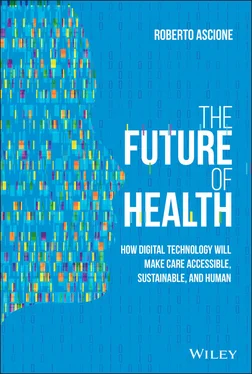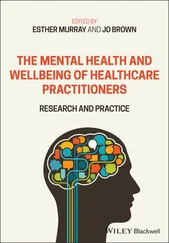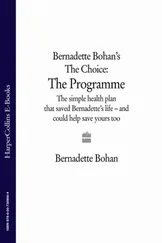We have gone from carrying with us very heavy and very expensive laptops with minimal computing power by today's standards, to using handheld computers, smartphones, tablets, and wearables. The process continues with the miniaturization and low cost of these devices reaching a point at which they are even ingestible . The widespread dissemination of these instruments among the public makes it possible to gather a quantity of information that was previously impossible. And this information, as it accumulates and we learn how to process it and act consequentially, begins to take on an ever-higher value from the standpoint of health care. We are, therefore, witnessing a widespread use of tracking instruments, created in the wellness or sports world, that are finding new applications in other areas. Indeed, ever-more-powerful algorithms analyze vast amounts of data, and correlations between this data and the most common pathologies are being discovered. On this basis, a new category of markers, called digital biomarkers , has been created. These are beginning to be examined in exactly the same way that normal blood tests are examined. In other words, researchers begin to monitor signals that may be related to particular disorders and then validate them with the idea of having markers that can be used to identify particular pathologies digitally in the future. For example, for attention disorders and Alzheimer's disease, applications of this type already exist and are currently undergoing clinical trials. Of course, in order to transform a normal process, we must identify a digital marker that is actually valid and scientifically sustainable. For example, there is a trial that is examining whether a certain type of continuous electrocardiogram (ECG), made with very low-cost sensors that could be incorporated into T-shirts, is predictive of major cardiac events, such as heart attacks. Let's imagine that this becomes possible and that, in the next few years, the sensors are so inexpensive that any T-shirt can make this kind of prediction. As a result, the management of a critical health event such as a heart attack (which requires immediate intervention in the place where it occurs) could be achieved with a routine operation such as an angioplasty.
Such sensors would be able to signal the likelihood of developing a certain pathology, and thus prompt the individual to schedule a specialist visit. This would completely change the management and treatment of a pathology as we imagine it today. Important transformations are taking place regarding the management of the personal data of each one of us: just think of the latest versions of the iOS and Android operating systems, in which real computerized medical records dedicated to the consumer/patient have been introduced. The symptom journal is a feature already embedded in operating systems that allows users to collect a large amount of information in a structured and processable way. A considerable number of clinical trials already have access to a much larger database than before. This data has been generated by participants thanks to the presence of these integrated applications in most smartphones.
Apple Watch was certainly not the first instrument on the market among the wearables. However, it has been one of the cornerstones in the health-care revolution. Through not only its built-in functions, but also scenarios it makes possible, it has proposed itself as a common interface to numerous health apps that can communicate with it. This is why the Apple Watch has turned out to be a very important instrument for increasing a patient's adherence to their health-care program. In fact, specific apps can send alerts to remind a person to take a particular medicine, or they can use the Apple Watch's sensor network to make predictions about certain pathologies and recommend specific health checks.
Since 2019, Apple Watch users can take part in the three medical studies launched by the health-care giant in collaboration with leading academic and research institutes, to monitor women's health, investigate the correlation between heart rate and mobility signals, and assess the impact that the daily exposure to sound has on hearing.
In the same year, the ECG function was made available to all the users of the Apple Watch Series 4. The ECG app makes it possible to record the user's heart rate and rhythm using an electric heart sensor, and then to check the recording for the presence of atrial fibrillation (AF). The ability of the app to accurately classify an ECG recording as AF was tested in a clinical trial involving about 600 subjects. The app had a 98.3 percent sensitivity in the classification of atrial fibrillation, and a 99.6 percent specificity in the classification of the normal sinus rhythm.
An important step in Apple's push to market its Apple Watch as a health and fitness device is represented by the agreements it has struck with insurance companies such as Aetna, United Healthcare, and Devoted Health, which are subsidizing the cost of the device for their policyholders.
Apple is joining forces with researchers to conduct three health studies that include using Apple Watch to explore how blood oxygen levels can be used in future health applications. This year, Apple will collaborate with the University of California, Irvine, and Anthem to examine how longitudinal measurements of blood oxygen and other physiological signals can help manage and control asthma.
Separately, Apple will work closely with investigators at the Ted Rogers Centre for Heart Research and the Peter Munk Cardiac Centre at the University Health Network, one of the largest health research organizations in North America, to better understand how blood oxygen measurements and other Apple Watch metrics can help with the management of heart failure. Finally, investigators with the Seattle Flu Study at the Brotman Baty Institute for Precision Medicine and faculty from the University of Washington School of Medicine will seek to learn how Apple Watch can detect signals related to heart rate and blood oxygen, which could serve as early signs of respiratory conditions like influenza and Covid-19. 1
Empatica Inc., a spin-off of MIT's Media Lab, with offices in Cambridge and Milan, has built a smartwatch based on an advanced machine learning algorithm. It is capable of identifying seizures and sending alerts to the caregivers, recording sleep and rest data, and detecting electrodermal activity (EDA). EDA allows researchers to quantify physiological changes in the sympathetic nervous system, also known as the fight-or-flight response. It is the first device linked to a neurological condition that has been approved by the FDA.
Certified in Europe and the United States, Empatica's Embrace 2 is a device for adults and children over the age of 6. In a multisite clinical trial, 135 patients diagnosed with epilepsy were admitted to high-level monitoring units for continuous monitoring of level IV epilepsy. There, video electroencephalography (EEG) was used to monitor their brain activity. Simultaneously, they wore an Empatica device. In 272 days, 6,530 hours of data were recorded, including 40 generalized tonic-clonic seizures. Embrace's algorithm has been shown to detect 100 percent of the seizures.
Proteus Digital Health, an American company founded in 2001 with headquarters in Redwood City, California, had set itself an ambitious goal: to design and create “digital” drugs. To achieve this, it concentrated on developing products, services, and data systems based on the integration of ingestible drugs and cloud computing. In early 2017, in collaboration with Otsuka Pharmaceutical, Proteus developed a pill called Abilify MyCite, which incorporates a microsensor containing copper, silicon, and magnesium. The sensor is about the size of a grain of sand and is seamlessly eliminated through the digestive track. It was the first digital pill to receive the approval of the Food and Drug Administration (FDA), the American authority that regulates new drugs and medical treatments. Abilify MyCite is an antipsychotic product based on aripiprazole, a molecule used in the treatment of bipolar disorders and schizophrenia. The digital version developed by Proteus contains a sensor activated by gastric acids in the stomach that sends a message to a patch applied to the patient's skin. The message is in turn sent to a smartphone. This data can be accessed, with consent, by the patient's health-care professional, family members, or even by friends. It is no coincidence that the first application of the digital pill concerns mental illness, where failure to adhere to treatment is often a serious problem. According to experts, non-adherence to prescribed treatments (i.e., not taking medicines or not taking the right amount) would cost, in the United States alone, between $100 and $300 billion per year.
Читать дальше












